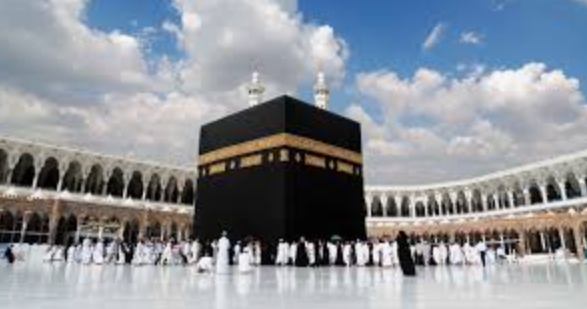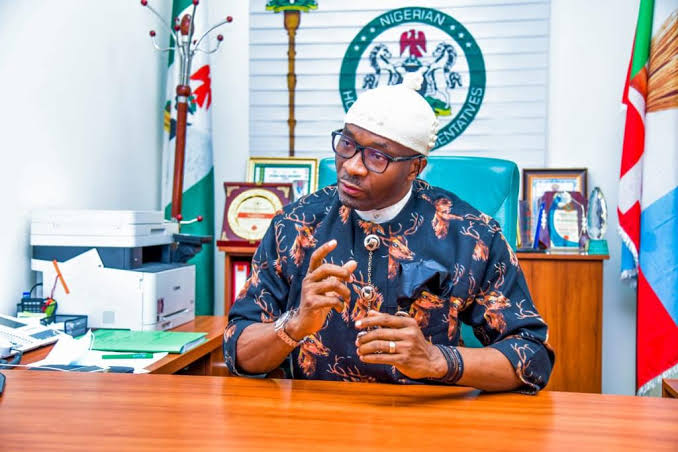News
Hajj 2025: Poor turnout as fare payment deadline ends today

By Kayode Sanni-Arewa
Nigeria may not fully utilise the hajj seats allocated it by the Kingdom of Saudi Arabia for the 2025 hajj pilgrimage due to low turnout as the payment deadline lapses today.
The National Hajj Commission of Nigeria (NAHCON) set the payment deadline for January 31, and reports indicate that there will likely be a repeat of last year’s situation where only 51,447 pilgrims paid, despite Nigeria receiving 95,000 slots.
The same number of slots have been allocated for 2025, but officials attribute the low turnout to the high hajj fares and short payment window.
This year’s hajj fare ranges between N8.3m and N8.7m for pilgrims travelling with state welfare boards. Those booking with private tour operators face even higher fares.
The early payment deadline was set by Saudi Arabia’s new policy, which requires all participating countries to finalise agreements four months before the start of the hajj to allow for better logistics planning.
While the payment deadline was extended last year due to low turnout, it remains unclear if that will happen this year.
FCT
In the Federal Capital Territory (FCT), the territory’s Muslim Pilgrims Welfare Board said only 700 intending pilgrims had completed payments by the deadline.
The board was allocated 4,148 seats, with 40% (1,659) reserved for the Jaiz Bank hajj scheme. The remaining 60% (2,489) were for general pilgrims, but as of January 30, only 700 had paid.
Muhammad Lawal Aliyu, the board’s spokesman, said while people are still rushing to make payments, the final count will be determined after the deadline.
States
In Kano State, which was allocated 4,356 seats, 2,100 intending pilgrims had completed their payments by January 30. The state government set February 3 as the payment deadline.
Sokoto State has 5,216 seats allocation, but officials are still compiling payment data from local governments and expect to finalize the list by February 2.
In Kaduna, over 6,000 seats have been allocated, and registration continues at 24 centres across the state. Officials could not confirm the exact number of registered pilgrims as of January 30, but they are hopeful that many will pay before the February 5 deadline.
In Kwara, the Pilgrims Welfare Board confirmed that over 1,000 pilgrims had made payments, with 4,365 seats allocated. The figure is expected to rise before the payment deadline.
Gombe had 1,480 seats allocated, but only 500 pilgrims had paid by January 30. The state is still encouraging more pilgrims to complete payments before the February 2025 deadline.
In Lagos, 500 pilgrims had completed their registration, but less than 50% of the 2,000 allocated seats have been filled as of January 30.
Officials cited the high cost of the hajj as a barrier, noting that many pilgrims were struggling to pay due to the economic situation in the country.
Alhaji Abdulfatah Abdulmojeed, a stakeholder in hajj operations, urged states to remit the funds for pilgrims who have paid to NAHCON to avoid delays in the preparation for the pilgrimage.
He also emphasised the importance of the Hajj Savings Scheme, similar to those in countries like Indonesia and Malaysia, to help Nigerian pilgrims manage the high costs.
He noted that the current economic situation may prevent Nigeria from filling all 95,000 hajj slots.
Efforts to reach NAHCON’s spokesman, Muhammad Ahmed, were unsuccessful. His phone number wasn’t reachable, and he also didn’t respond to text messages.
However, an internal source indicated that the commission might not extend the deadline due to the agreements already made with service providers for the 2025 Hajj.
He said early payments are crucial to securing accommodation and other logistics for Nigerian pilgrims.
By Faruk Shuaibu & Hussein Yahaya (Abuja) Salim Umar Ibrahim (Kano) Abubakar Auwal, (Sokoto) Mohammed Ibrahim Yaba (Kaduna) Mumini Abdulkareem (Ilorin) Haruna Gimba Yaya (Gombe) & Abdullateef Aliyu (Lagos)
News
A Chat with Janet Odio Okolo: A Mother’s Journey Raising a Child with Down Syndrome

News
Hon. Nnamchi Begins Street Lights Deployment In Isi Uzo(Photos)

Honourable Paul Sunday Nnamchi, representing Enugu East/Isi Uzo Federal Constituency in the 10th House of Representatives, has fulfilled his promise to illuminate communities in Isi Uzo Local Government Area.
The lawmaker has just begun the deployment of high-density solar-powered street lights in Ikem Nkwo, marking the beginning of a massive rollout of the street lamps across the communities in Isi Uzo.
This initiative, which started in Enugu East Local Government Area in 2024, aims to support the fight against insecurity in the state which according to him was to add to what Chief Security Officer of Enugu State Barrister Peter Mba had done to secure the state to attracts foreign investments.
The lawmaker expressed concern over banditry attacks, particularly by herdsmen, in some communities within Isi Uzo and Enugu East Local Government Areas in the recent pasts.
He believes that illuminating these areas with high-density street lights would help address the insecurity adding that he was prioritizing border and farming communities in Isi Uzo, where banditry has displaced residents and restricted farming activities.
Communities in Ikem, Eha-Amufu in Isi Uzo which borders Enugu and Benue State and Ugwogo-Nike in Enugu East have been vulnerable to these attacks due to their strategic locations.
News
May Day: Kalu Hails Workers, Applauds Their Role in Nation Building

By Gloria Ikibah
Deputy Speaker of the House of Representatives, Rep. Benjamin Kalu, has extended warm wishes to Nigerian workers as the country marks the 2025 edition of International Workers’ Day.
Kalu praised workers across various sectors for their commitment and resilience, describing them as the engine that keeps the nation moving. He acknowledged their sacrifices and unrelenting drive, especially during tough economic times.
In his message, he highlighted the efforts of the current administration under President Bola Tinubu to improve the welfare of public servants. He referenced the National Assembly’s prompt backing of the new minimum wage as a sign of the government’s seriousness about workers’ wellbeing.
The Deputy Speaker appealed for continued patience and understanding from Nigerians, noting that the ongoing economic reforms, while challenging, are designed to bring long-term relief and prosperity.
Kalu also called for unity, and said the country can only overcome its present difficulties if citizens and leaders work together in good faith.
He therefore urged workers to keep the faith and remain steadfast in their duties, assuring them that brighter days are on the horizon, and wished Nigerian workers a peaceful and fulfilling May Day celebration.
-

 Metro16 hours ago
Metro16 hours agoGunmen storm University of Benin teaching hospital, kill doctor
-

 Metro17 hours ago
Metro17 hours agoFCTA destroys 601 motorbikes over violations
-

 News8 hours ago
News8 hours agoAlleged money laundering: EFCC produces Aisha Achimugu in court
-

 News17 hours ago
News17 hours agoJust in: FG declares tomorrow public holiday
-

 News10 hours ago
News10 hours agoJUST IN: Major General Paul Ufuoma Omu Rtd, dies at 84
-

 News12 hours ago
News12 hours agoSAD! Professor’s son takes own life inside varsity staff quarters
-

 News10 hours ago
News10 hours agoTinubu hails Dangote’s World Bank appointment
-

 News16 hours ago
News16 hours agoFull list: FG approves N110bn to rehabilitate medical schools 18 institutions























